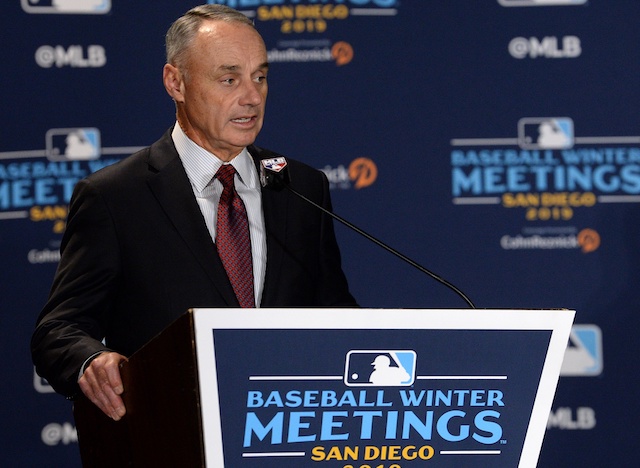For the first time since 1994-95, there is a work stoppage in Major League Baseball. Due to an inability to agree on a new Collective Bargaining Agreement, the owners unanimously voted to lock out the players.
So what does this mean? It means that until a new CBA is agreed to, there will be a freeze on all transactions, negotiations, and discussions between players and their teams. The MLB website makes things as clear as day, with current players being scrubbed out of existence.
There will be no free agent signings, no rumors, and no trade talks for a little while, leading to a completely dark period for baseball.
MLB Commissioner Rob Manfred detailed his reasoning for a lockout in a statement to fans. “This defensive lockout was necessary because the Players Association’s vision for Major League Baseball would threaten the ability of most teams to be competitive,” Manfred said. “It’s simply not a viable option. From the beginning, the MLBPA has been unwilling to move from their starting position, compromise, or collaborate on solutions.”
The MLB Players Association quickly responded to this statement, via MLBPA Executive Director Tony Clark. “This drastic and unnecessary measure will not affect the Players’ resolve to reach a fair contract. We remain committed to negotiating a new collective bargaining agreement that enhances competition, improves the product for our fans, and advances the rights and benefits of our membership.”
In these situations, it’s almost impossible to tell who was asking for what in the negotiations, as very few people are actually in the room making decisions. However, the owners were not forced — in any way — to lock the players out, and the insinuation of that in Manfred’s statement in unequivocally false.
The owners chose to lock out the players because they likely felt that their financial prospects were being diminished by players asking for fair treatment. Manfred uses the fact that $1.7 billion was spent in free agency in November to say that the players already get treated fairly, but conveniently leaves out the fact that only a select few will see this money.
Meanwhile, it’s possible that the players are making some unreasonable requests, as is always the case when two sides negotiate on something of this magnitude. However, the underlying theme of their negotiation has stayed the same for decades: the players just want fair treatment from top to bottom.
The next few weeks will be telling as to how the league and the players want to handle such a delicate time. They have about two months to figure out a compromise before it’s time for Spring Training to get underway.



